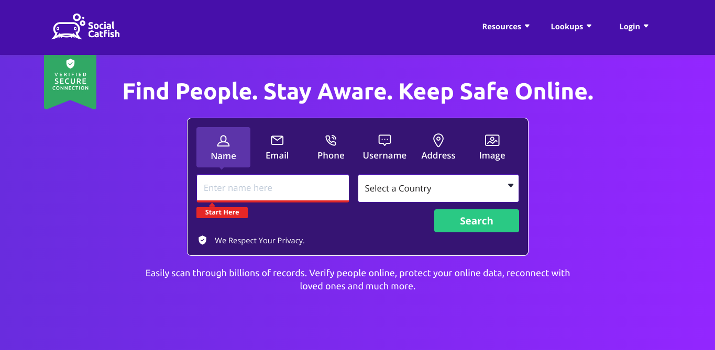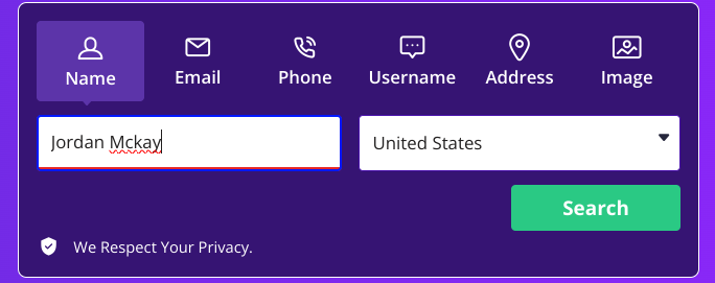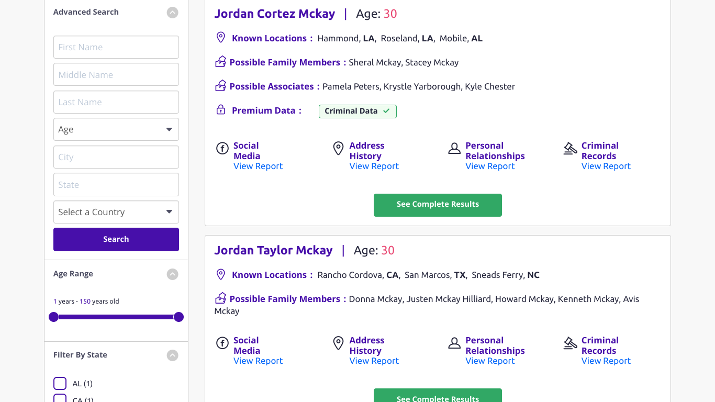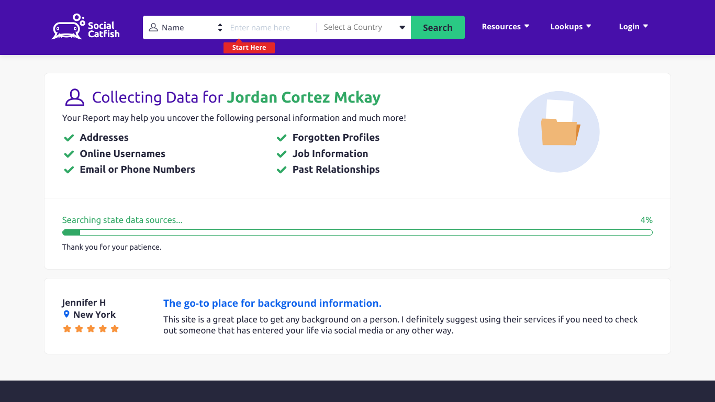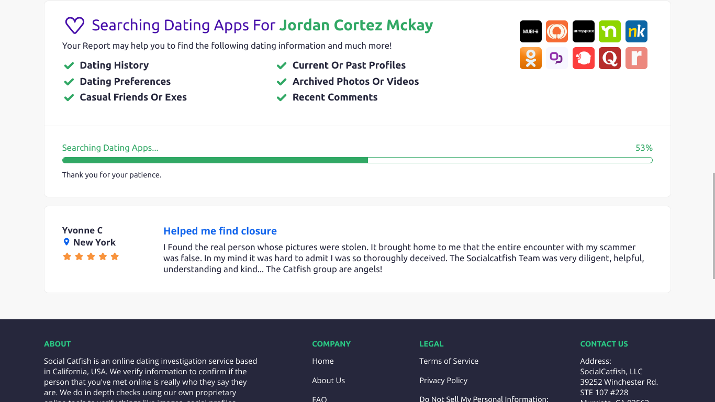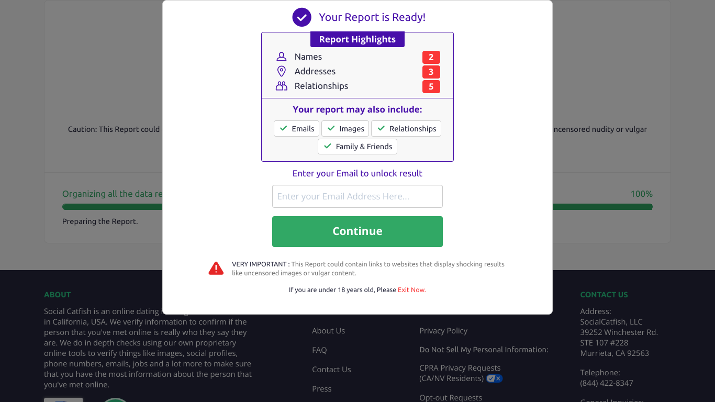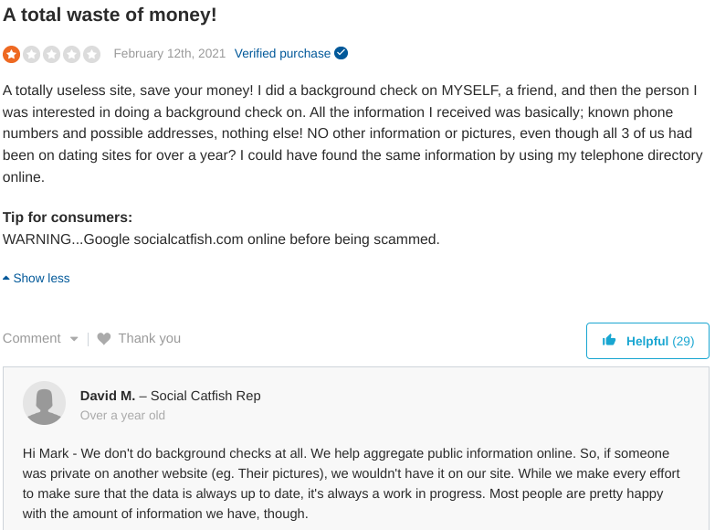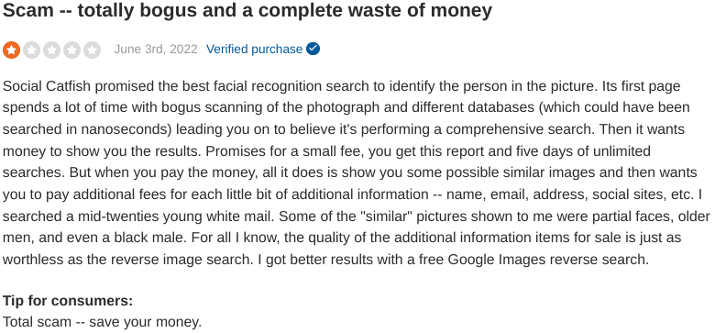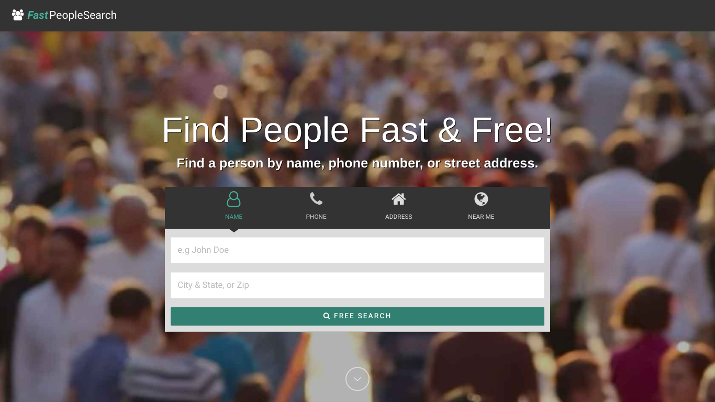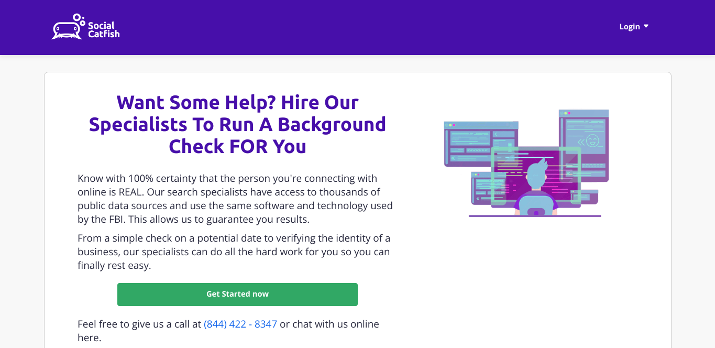Social Catfish is a people finder website that allows you to search for someone’s personal information and find out if they are who they say they are.
The site promises to search through billions of records to verify if someone on a dating site or anywhere else online is real or a catfish.
It also promises to give you other images of them found on the internet, their phone numbers, social media handles, and more.
Catfishing is a common problem, so it’s understandable that when you’re dealing with strangers, you want to find out more about them.
However, is Social Catfish free to use? Let’s find out.
Here’s a brief summary before we dig into it.
Check Out: Best Alternatives To Social Catfish
Quick Summary
- Social Catfish is an identity verification check service, also known as a people’s finder website. You can conduct reverse image searches or look an individual up using their name, address, phone number, or even online username.
- However, it is not free to use. Like many other people finder websites, it only discloses the price after making you go through many steps, which is disappointing and incredibly frustrating.
- It sometimes gives you very limited information for free, which won’t be useful in most cases.
Catfishing/Social Catfish
Catfishing is a practice in which people set up dating profiles or social media accounts pretending to be people they are not.
They may pretend to be a specific person whose images they stole from social media, or they may generate completely fake profiles by using AI-generated images that look incredibly realistic.
There are several reasons people may try to catfish you. Sometimes, it’s because they’re bored and want to chat with people online for fun, without revealing their identity.
At other times, they are trying to get money out of you under false pretenses. For example, scammers often create fake profiles pretending to be women interested in maintaining a conversation with you, only to ask you to lend or give them money down the line.
This is known as a romance scam.
Sometimes, it’s even more sinister than that. They may set you up for a robbery by requesting that you meet up with them, or they may phish for personal information after they have gained your trust and use it for identity theft.
In either case, Social Catfish allows you to look someone up using their picture or username to see if their profile is real. If you find that the picture belongs to someone else, you will know you are being catfished.
Social Catfish isn’t just for combatting catfishing, though. You can use it to learn more about anyone you are currently dating or talking to in any capacity, including business.
For example, if there is someone you know by the name of Tim McKim, you might want to look up their phone number and social media handle. Perhaps you went to school with them and need to contact them, but no longer have their contact details.
In that case, people finder websites can help. By using their name and known cities of residence (including past ones), you can find their current information.
Using a phone book is probably no longer useful, because it may have been a long time since you’ve known that person. Over the years, they may have moved to a new city or state; they may no longer own a landline or may have changed their cellular number.
Is Social Catfish Free to Use?
Not really. Sometimes, it will give you very limited information at no cost to hook you in, but the information you get for free is very limited and not very useful. You will likely find the information you are really looking for behind a paywall.
There is a way that might allow you to use the background check service for free, but it requires some work on your part; more on that later.
The problem with most people finder websites is that they are pretty deceptive and perform a bait and switch to get people to pay.
They’ll start by giving you a search tool that is seemingly free and asking you to enter someone’s name, address, or other personal details to reveal more information about them.
On Social Catfish, you have the following search options:
- Name
- Phone
- Username
- Address
- Image
Check Out: Best Spydialer Alternatives
Disclaimer: Any names used are for illustration purposes only. Any resemblance to real persons is by coincidence.
As you can see from the screenshot, there is no indication that the tool will require payment, so many people think it will be free, especially if they have never used such a tool before.
So, you click on the green search button, and proceed to enter additional information, such as their state, city, and age range. At that point, you’re already starting to become invested in finding the results, as you are putting effort into this.
Then, the site gives you very limited, impartial results, but only some of the time. It only did it for me the first time; subsequent times, it didn’t disclose any information for free but demanded payment immediately.
In my first search, I got the following information for free:
- Age
- Locations where they are known to have lived
- Possible family members
- Possible associates
That doesn’t tell you much. If you are looking up an old schoolmate or work associate, there isn’t much you can do with this information; there’s no address or contact details.
You likely already know their age and possibly their siblings as well.
If you want to know if someone is catfishing you, it is also hard to tell from these results whether the person you are chatting to is real or not. The only information you have to go off of are their age and relatives.
Depending on the person you searched for, you may even get less information than that. It also depends on the type of information you inputted.
This is the information I found when I searched for “Jordan McKay.” There were only two results.
Also Read: How To Remove Yourself From TruePeopleSearch?
When you click on “See Complete Results” or “View Report,” the site will make a big show out of scanning multiple databases and public records:
It also makes a big deal out of searching dating sites, chat apps, social media, and other sites. It even gives you a “Very Important” warning message, stating: “This report could contain links to websites that display shocking results like uncensored images or lewd content.”
It’s all for shock value, really. The whole process of scanning through different sites is designed to make you think that it is uncovering a lot of information, but it’s purely a marketing tactic.
There’s no scanning taking place in real time. It’s designed to make you wait and increase your excitement and expectations about finally getting the results.
At the end of the entire thing, the site will ask you to enter your email address. People who don’t know how people finder websites work think that the results will immediately be sent to their email at no additional cost.
However, that’s not the case at all. Instead, the site takes you to a payment page, requiring a small payment of $5.73 to unlock the report.
The kicker, though, is that this $5.73 (or whatever other small fee it might happen to charge at any given time) is only for a three-day trial period. After that, you will be billed $27.48/month for continued access to the platform.
This strategy actually works really well. At that point, many users are already invested emotionally in seeing the results; they have been anxiously awaiting the results of all those “scans” being conducted.
So, they’ll feel pressured to pay a small fee of around $5. It’s not that much money, right?
Many people, though, forget to cancel their subscriptions before the three days are up. Others don’t even bother to read the small print that they will be charged a higher amount every month, thinking it’s a one-time fee for the report.
To make matters worse, Social Catfish starts a countdown timer of five minutes on the checkout page, claiming it can’t guarantee your report if you don’t pay by that time.
That’s obviously not true. Data won’t change that quickly; the likelihood of someone changing their address or phone number within five minutes is close to zero.
It’s simply a marketing tactic to create urgency and pressure more people to pay the fee.
Sometimes, you don’t even get any information for free. On subsequent searches, Social Catfish made a whole show of scanning multiple databases (again, this is bogus as no scanning is actually taking place) and then gave me zero information, instead prompting me to sign up for the paid plan.
Also Read: Best Zabasearch Alternatives
Is Social Catfish Misleading?
Social Catfish and other people finder sites are often misleading about the exact amount of information they have on a person.
Often, they will tell you that there are a lot of results from a search, and so you will be tempted to pay the small fee to uncover them. However, when you do, you will find some basic information that you could have found online for free, such as:
- The person’s relatives
- Possible addresses
- Possible phone numbers that may not be current
In a reply to a reviewer on TrustPilot, a representative of Social Catfish admitted that the site doesn’t do any background checks. Instead, it simply aggregates publicly available information that you could probably find for free by searching through public records.
So, if you think that you can enter someone’s name and magically get all their photos, phone numbers, social media usernames, dating site profiles, family members, address, email, and other details, you are likely to be disappointed.
You are very unlikely to get all of that information. Most people finder sites are no different.
They can list addresses, relatives, and phone numbers, simply because these are public records and easily accessible.
According to Experian, which offers a service that scans the web for my private data, at least 10 different people finder sites have my address and a few of my relatives (but not a complete list) as well as some cellular numbers I used to own.
However, finding someone’s social media accounts is a lot harder and often impossible, especially if they aren’t using their real names on their Instagram, TikTok, or Facebook accounts.
In addition, phone numbers are changed all the time, and people can buy prepaid sim cards with new numbers, information that isn’t readily accessible in real time.
The reverse image search feature is cool, but it’s not much better than Google or other reverse image search engines like PimEyes.
Not only that, but according to reviews on TrustPilot, Social Catfish continuously tries to upsell you on additional subscriptions and purchases, even after you pay the monthly fee. You might get some results at no cost, but then you will have to pay for more information.
Should You Pay for Social Catfish?
I wouldn’t recommend it. Social Catfish can work at times, and you may uncover details like addresses, relatives, and other public records.
However, you are unlikely to get all the information you are looking for if you want usernames, social media handles, and updated phone numbers.
In addition, the reverse image search feature seems to frustrate a lot of people, giving random or incomplete results and returning the same results for different people.
You can get more information for free by using FastPeopleSearch.com.
When I searched for myself on FastPeopleSearch, I found my address, past cellular phone numbers (although not all were accurate and some belonged to relatives), and a list of relatives. However, it listed some past places of residence where I never lived.
All that was for free, while Social Catfish hid it behind a paywall. FastPeopleSearch also didn’t make a whole bogus show of scanning databases, showing you all the information immediately.
However, FastPeopleSearch makes money by trying to sell you a “full” background report, directing you to TruthFinder, a Social Catfish competitor.
Another site that provided the same information for free is TruePeopleSearch.com. It listed the same information as FastPeopleSearch for free; in fact, this same information was on 10 people finder sites, according to my Experian identity protection report.
Also, you can search for a lot of information yourself. If you want to find someone’s Facebook account, simply go to Facebook and search for their name.
You can use filters if you already know their city. Note that not all people list their cities in their profiles, and although Facebook requires people to use their real names when signing up, some people may use fake names or nicknames (such as Timmy instead of Timothy).
There are competing paid sites that may be better and more updated than Social Catfish, such as Instant Checkmate, TruthFinder, or Spokeo.
However, it depends on the subject being searched, and there is no guarantee they will have more information than Social Catfish. Also, the FTC fined Instant Checkmake and TruthFinder $5.8 million for deceiving users and misleading them about what the reports will contain, casting light on what the people finder industry is really about.
According to the FTC, these people finder sites often claimed that a person had a criminal record, but when you pay for the report, there is only a record about a traffic ticket.
In addition to free and paid people finder sites, you can use court records lookup sites like Unicourt.
Also Read: Yellow Pages vs Whitepages
Is There Any Way to Use Social Catfish for Free?
There is one way, but it’s not for the standard Social Catfish membership. Instead, it’s for its premium background check service, which is more in-depth and involves a manual background check by specialists.
This background check may or may not uncover more information than what is accessible through public records ($397 is the current price; check here for updated pricing).
One way to get this service for free, if you are trying to uncover a possible dating app scammer or romance scammer, is by allowing Social Catfish to share your story on their YouTube channel, as outlined in this post.
As long as this offer is currently available, you can email ShareMyStory@socialcatfish.com for more information about the offer, but you will need to sign a waiver and agree to make your story public.
Final Thoughts
Social Catfish is not free.
While it sometimes offers limited information for free, it won’t be of much use to you, and you will be pushed and prodded to upgrade to a premium subscription (and possibly additional upsells) to get more data.
Once you do upgrade, though, you may feel misled, as you might not get the complete data you were looking for. Unfortunately, this is common throughout the people finder industry.

